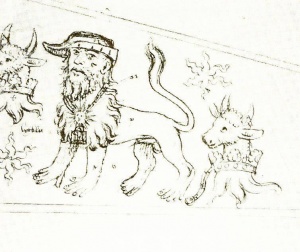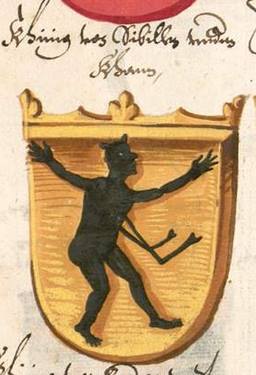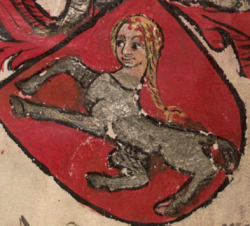Humans, Humanoid Monsters
WARNING: Do not cite this page as a reference. This page is on this wikispace only to make the content "searchable" and easier to find. If you find the information you seek here, go to the original sources to verify the information and use them for your documentation.
Examples:[edit | edit source]
Period:[edit | edit source]
On horseback:[edit | edit source]
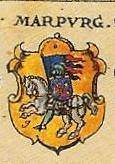
|
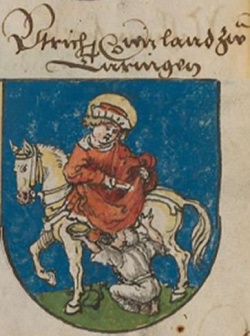
|
| Siebmacher Wappenbok, 1605, plate 223, knight on horseback with banner | Sammelband Mehrerer Wappenbücher BSB Cod.icon. 391, 1530, Saint Martin |
Cavorting, demi-boy making a face:[edit | edit source]
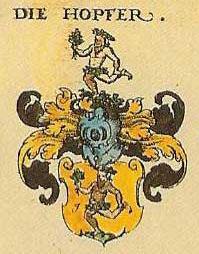
|
File:Arlberg 1548 knave.jpg |
| Canting Arms, Siebmacher Plate 215 | Reyssmaull, with the blazon: "In Rot wachsender silbern gekleideter Knabe mit silberner Kappe mit linker schwarzer Feder darauf, der mit beiden H{a:}nden die offenen Lippen waagrecht fletscht." Which may translate into "Gules, a boy argent rising (issuant? demi?) capped argent with a black feather in the cap to sinister, with both hands stretching his parted lips fesswise." |
Demi-monk in crown, fish surfing:[edit | edit source]
| File:Siebmacher plate067 monkcrown.jpg | |
| Siebmacher 1605, plate 67, crown and monk | BSB Csg 9210, Grunenberg Wappenbuch, 1602-04, f03, fish surfing woman |
Kayaking:[edit | edit source]
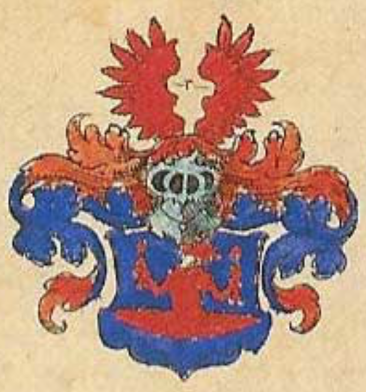
|
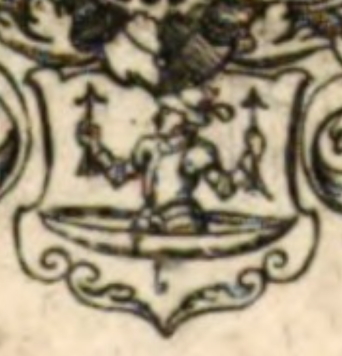
|
| Siebmacher's 1605, folio 58, arms of die Bezisski, "Azure, an armored little man proper in a boat maintaining in each hand an arrow inverted gules" | Siebmacher with clearer lines (in armor!) |
Man-tyger, insect-armed devil, donkey-lady:[edit | edit source]
Chicken-head[edit | edit source]
| BSB Cgm 145, Das Wappenbuch Conrads von Grünenberg, 1480, folio 212, chicken-head |
Minotaurs:[edit | edit source]
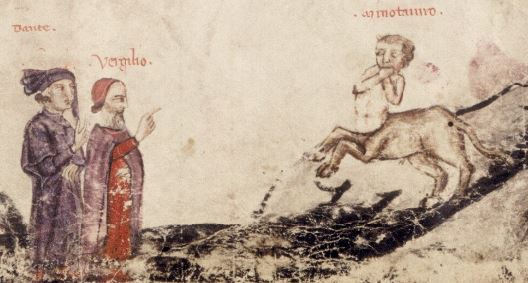
|
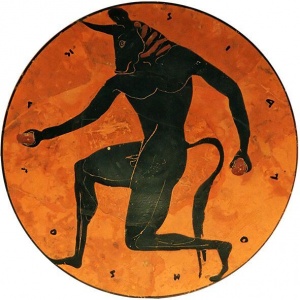
|
| MS Holkham Misc. 48, p. 17, Bodleian Library, medieval minotaur (bull body with human torso) | Classical Greek minotaur (human body with bull's head), Kylix Greek Black Figure pottery, 515 BCE |
Modern:[edit | edit source]
Pictorial Dictionary, 3rd edition:[edit | edit source]
Vector Graphics:[edit | edit source]
Annotated Pennsic Traceable Art Project[edit | edit source]
Related separate articles:[edit | edit source]
- Angel (charge)
- Archer
- Arm
- Body Part
- Bone
- Hand
- Head
Sources:[edit | edit source]
Academy of St. Gabriel "Medieval Heraldry Archive" - http://www.s-gabriel.org/heraldry/
Archive of St. Gabriel reports - http://www.panix.com/~gabriel/public-bin/archive.cgi
Laurel Armory Articles - http://heraldry.sca.org/laurel/armory_articles.html
SENA Appendix L:[edit | edit source]
A Partial List of Postures and Orientations
This is a list of postures and orientations that can be used to determine whether two charges or groups of charges conflict or whether there is a distinct change for posture/orientation.
Animate Charges
E: Humanoids: This category is for humans and humanoid monsters. The postures listed within each group generally conflict.
- statant
- statant affronty
- mounted on a horse or other creature
Precedents:[edit | edit source]
Precedents of the SCA College of Arms - http://heraldry.sca.org/laurel/precedents.html
Morsulus Heralds Website - http://www.morsulus.org/ (to search the LoARs and Precedents)
Use the above links to be sure any precedents listed below haven't been superseded by newer precedents.
Definition:[edit | edit source]
January 2021 CL - On Humans Proper[edit | edit source]
Effective immediately, we are retiring Caucasian as the definition of the proper color of human skin for any registrations made on or after this date. This affects not just humans as charges, but human body parts such as arms, as well as monsters composed from human parts, such as centaurs and mermaids.
Going forward, we will require specification of the intended flesh color. The use of existing charges such as the Turk and the Saracen, both of which include skin tincture as part of their definitions, remains unaffected. However, the following terms are also available, and represent the basic approach which we will build upon as needed for future submissions:
- Black or dark-skinned: Sable or a shade of black or dark brown; hair tincture must be specified. Due to the overlap in possible shades, no difference is granted between brown-skinned and dark-skinned humans or human parts. For purposes of contrast, this tincture is considered a color.
- Brown or brown-skinned: Any shade of brown except light tan (which is considered light-skinned); hair tincture must be specified. Due to the overlap in possible shades, no difference is granted between brown-skinned and dark-skinned humans or human parts. For purposes of contrast, this tincture is considered a color.
- White or light-skinned: Argent, light pink or light tan; hair tincture must be specified. For purposes of contrast, this tincture is considered a metal.
- Any standard heraldic tincture.
Following existing practice, the use of a term other than a standard tincture will entail the use of the term proper. We will also capitalize Black, Brown, and White when used on their own as terms describing human skin. For example, each of the following pairs are equivalent to each other:
- a dark-skinned human arm proper, or a Black human arm proper
- a light-skinned maiden proper crined Or, or a White maiden proper crined Or
- a brown-skinned seraph proper crined gules, or a Brown seraph proper crined gules
Because of the large number of existing registrations this affects, we do not plan to undertake a bulk reblazoning project for this and instead will reblazon opportunistically, as time allows and need demands.
https://heraldry.sca.org/loar/2021/01/21-01cl.html#3
September 2009 - minotaur:[edit | edit source]
Gawayn Langknyfe. Device. Per bend sinister sable and gules, a bull-headed human with bull's hoofs vested of a loincloth per bend Or and argent between in bend a battle axe Or and a battle axe argent. "Blazoned on the LoI as a minotaur, the monster drawn here fits neither the Classical Greek nor the medieval definition of the term. The Classical Greek minotaur of antiquity was drawn on pottery as a man with a bull's head; by medieval times, the minotaur was depicted as a centaur-like monster with a bull's body, a man's torso, and occasionally bull's horns from the man's head..."
http://heraldry.sca.org/loar/2009/09/09-09lar.html
December 2002 CL - From Wreath: Brown Humans[edit | edit source]
Here follow the SCA's standard depictions, attributes, and proper colorations for some of the different varieties of people found in period heraldry. The following definitions should allow the SCA to recreate all the varieties of people found in period emblazons, using the most common blazon term for each of these varieties of people.
The proper tincture for varieties of people not described below continues to be Caucasian proper [overturned in Jan 2021 CL above], with hair color specified in the blazon.
- The Turk: The Turk is drawn with a large mustache. By default he is bare-headed with a distinctive hairstyle (shaven head except for a topknot). If the Turk is vested of a turban it must be explicitly blazoned. When proper, he is Caucasian with dark hair.
- The Moor and the Blackamoor: The terms Moor and Blackamoor will both be used to blazon the same sort of human. He has Negro features, and is clean-shaven with short curly/nappy hair. If the Moor or Blackamoor wears headgear, such as a torse, it must be explicitly blazoned. When proper he is dark brown, a tincture which classifies as a color (rather than a metal), and his hair is black.
- The Saracen: The Saracen has Semitic features, and is bearded by default. His hair, when visible, is long and wavy. He is depicted with headgear; usually this is a turban, but sometimes it is a torse or a crown. The type and tincture of the headgear must be explicitly blazoned.
- Saracens in period heraldry may be found in two different proper colorations. Saracens may be tinctured in a light shade, roughly that of a suntanned Caucasian. This shade classifies as a metal for purposes of contrast. Saracens may also be tinctured in the same way as the Moor or Blackamoor, dark brown with black hair. The light proper tincture appears to be more common in period heraldry and also matches the defining SCA Saracen's head in the 1978 registration of Athelas of the Knife, reblazoned in the West section of this LoAR. Thus, a default Saracen proper is a light tincture, the tincture of a tanned Caucasian, and is considered heraldically equivalent to a standard Caucasian tincture (although as an artistic note, the period rolls using both standard Caucasians proper and Saracens proper generally draw the Saracens proper slightly darker than the Caucasians proper).
- The SCA has not yet received a submission using the dark brown version of a Saracen proper. This sort of Saracen proper would need to be distinguished in blazon from the default Saracen proper for reasons of contrast and reproducibility of emblazon. Some commenters suggested that we might blazon such a charge as a brown Saracen proper. This is not a mellifluous blazon, but it has the virtue of clarity. The final decision on what to term such a charge may be deferred until we receive a submission with such a charge.
https://heraldry.sca.org/loar/2002/12/02-12cl.html
Registerability:[edit | edit source]
(Restricted, Reserved, SFPP, OOP)
August 2011 - demons:[edit | edit source]
From Wreath: On Demons
A submission this month included a demon. We have only registered a demon nine times, most recently in July 2000. Further research has not shown any instances of a demon as a period heraldic charge. Depictions of demons in period medieval art vary wildly: generally shaggy, but occasionally more dragon-like, feet usually cloven but occasionally clawed like a dragon, sometimes with wings, sometimes without, sometimes with horns, sometimes without, sometimes with a very bestial face, sometimes with a more human face. Demons do not appear to have a standard depiction.
Barring evidence for the use of demons as a period charge, we will cease to register demons after the February 2012 Laurel meeting. This explicitly overturns the precedent set in September 1992: "The demon is a period heraldic charge, as found in the arms of the city of Brussels (Gules, the archangel Michael Or vanquishing a demon underfoot sable). [Asher Truefriend, Sep 1992, A-West]". It has since been determined that the arms of the city of Brussels are post-period.
This does not affect the registerability of demon heads, which have a far more standard depiction.
http://heraldry.sca.org/loar/2011/08/11-08cl.html
September 1997 - no rampant humans[edit | edit source]
[W]e don't register rampant humans or humanoids.
January 1995 - rampant humans?[edit | edit source]
'Rampant' does not appear to be a human posture.
Conflict:[edit | edit source]
September 1997 - tincture of wings:[edit | edit source]
Just as we will give a CD for changing the tincture of the wings on a winged monster, so do we give one for changing the tincture of the flames of a phoenix." September 1997 LoAR
Identifiability:[edit | edit source]
September 2009 - bull-headed human horns:[edit | edit source]
Gawayn Langknyfe. Device. Per bend sinister sable and gules, a bull-headed human with bull's hoofs vested of a loincloth per bend Or and argent between in bend a battle axe Or and a battle axe argent. "This device is returned because the primary charge is not recognizable. The monster's horns were drawn here to blend with the body, in such a way that they could not be distinguished. If any charge's identifying features are not readily seen, that charge is not identifiable, and thus not registerable."
http://heraldry.sca.org/loar/2009/09/09-09lar.html
Collected Precedents:[edit | edit source]
Tenure of Elisabeth de Rossignol (May 2005 - July 2008) - HUMAN FIGURE
The 2nd Tenure of François la Flamme (October 2004 - May 2005) - HUMAN, MONSTER -- Humanoid, MONSTER -- Merfolk
The Tenure of Shauna of Carrick Point (May 2004 - August 2004) - Collected Armory Precedents
The Tenure of François la Flamme (August 2001 - April 2004) - Collected Armory Precedents
The Tenure of Elsbeth Anne Roth (June 1999 - July 2001) - Collected Armory Precedents
The Tenure of Jaelle of Armida (June 1996 - June 1999) - Single HTML Document
The 2nd Tenure of Da'ud ibn Auda (November 1993 - June 1996) - the 1st part (Nov 1993 - June 1994) and the 2nd part(July 1994 - June 1996)
The Tenure of Bruce Draconarius of Mistholme (June 1992 - October 1993) - Collected precedents
The 1st Tenure of Da'ud ibn Auda (June 1990 - June 1992) - the 1st year (June 1990 - June 1991) and the 2nd year(July 1991 - June 1992)
The Tenure of Alisoun MacCoul of Elphane (September 1986 - June 1990) - Collected Precedents
The Tenure of Baldwin of Erebor (August 1984 - August 1986) - Single HTML Document
The Tenure of Wilhelm von Schlüssel (August 1979 - August 1984) - Collected Precedents
The Tenure of Karina of the Far West (December 1975 - June 1979) - Collected Precedents
The Early Days (June 1971 - June 1975) - Collected Precedents
In the Ordinary[edit | edit source]
- Human - see Human figure
- Human body - see Human figure
- Human eye - see Eye
- Human figure (includes baby, boy, child, demon, equestrian, figurehead, fool, girl, hellene, hermit, human body, infant, lady, maiden, man, palmer, pilgrim, rider, rustic, sapper, saracen, sauvage, savage, scholar, )
- Human foot - see Leg - Human
- Human footprint - see Paw print
- Human hand - see Hand
- Human head - see Head - Human
- Human heart - see Heart
- Human leg - see Leg - Human
- Human skull - see Head - Human skull
- Monster - Humanoid - see also Human figure and Monster - Merfolk and Monster - Centaur
